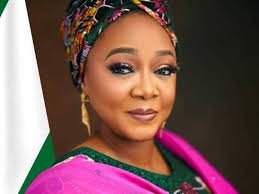The Minister of Women Affairs, Imaan Sulaiman-Ibrahim, has urged parents, community and religious leaders to invest in girls’ education to break the cycle of poverty.
She described education as a tool that lays the foundation for a more prosperous society and a key that unlocks the boundless potential of children.
The minister spoke at the National Conference on Girl Child Education held in Abuja.
She said: “When we educate a girl, we empower a generation. We prepare her to become a change-maker for her family, her community, and the nation at large.”
The minister referenced research from the Federal Ministry of Education and the World Bank which shows that every additional year of schooling increases a woman’s earning potential by 10–20 per cent.
She said: “In Nigeria, women make up 41 per cent of the labour force.
“Yet, despite their significant presence, millions of girls remain locked out of education, limiting their capacity to achieve their potential and contribute to national development.
“Imagine a Nigeria where every girl is given the tools to succeed—what a transformative impact it would have on our economy, our communities, and our collective future.
“The challenges we face in ensuring education for all girls are monumental but not insurmountable.
“An estimated 10.5 million Nigerian children are out of school, with girls making up the majority of this number.
“For many, early marriage, cultural norms, economic hardship, and violence act as insurmountable barriers to education.
“Harmful practices such as child marriage and female genital mutilation rob our girls of their futures. Girls are disproportionately affected by gender-based violence, trafficking, child labour, and other systemic inequalities.
“These barriers are not just obstacles, they are violations of human rights. They rob our children of their dignity, humanity, and future.
“As we gather here today, we must recommit ourselves to tearing down these barriers and providing every girl with the opportunity to learn, grow, and thrive. Despite the challenges, there are glimmers of hope.
“Initiatives like the Adolescent Girls Initiative for Learning and Empowerment (AGILE), supported by the World Bank, have demonstrated what is possible when we work together.
“AGILE has provided scholarships, created safe learning spaces, and supported underserved communities, ensuring that girls stay in school and succeed.
“These interventions exemplify the kind of collaboration we need to scale up and replicate nationwide.
“It may please you to know your excellencies and distinguished guest, that at the First Global Ministerial Conference on Ending Violence Against Children in Bogotá, Colombia, I proudly reaffirmed Nigeria’s commitment to ending violence against children.
“Education was at the heart of that commitment because we recognise it as a powerful tool for protection and empowerment.
“We are also preparing to launch the National Costed Action Plan on Ending Child Marriage, which will enhance our ability to address this critical issue through sustainable, culturally sensitive approaches.”
The minister concluded that under the directive of President Bola Ahmed Tinubu, the Ministry of Women Affairs has developed a Strategic Action Plan (2024–2027) that outlines bold initiatives to address systemic challenges facing Nigerian girls.
![]()










